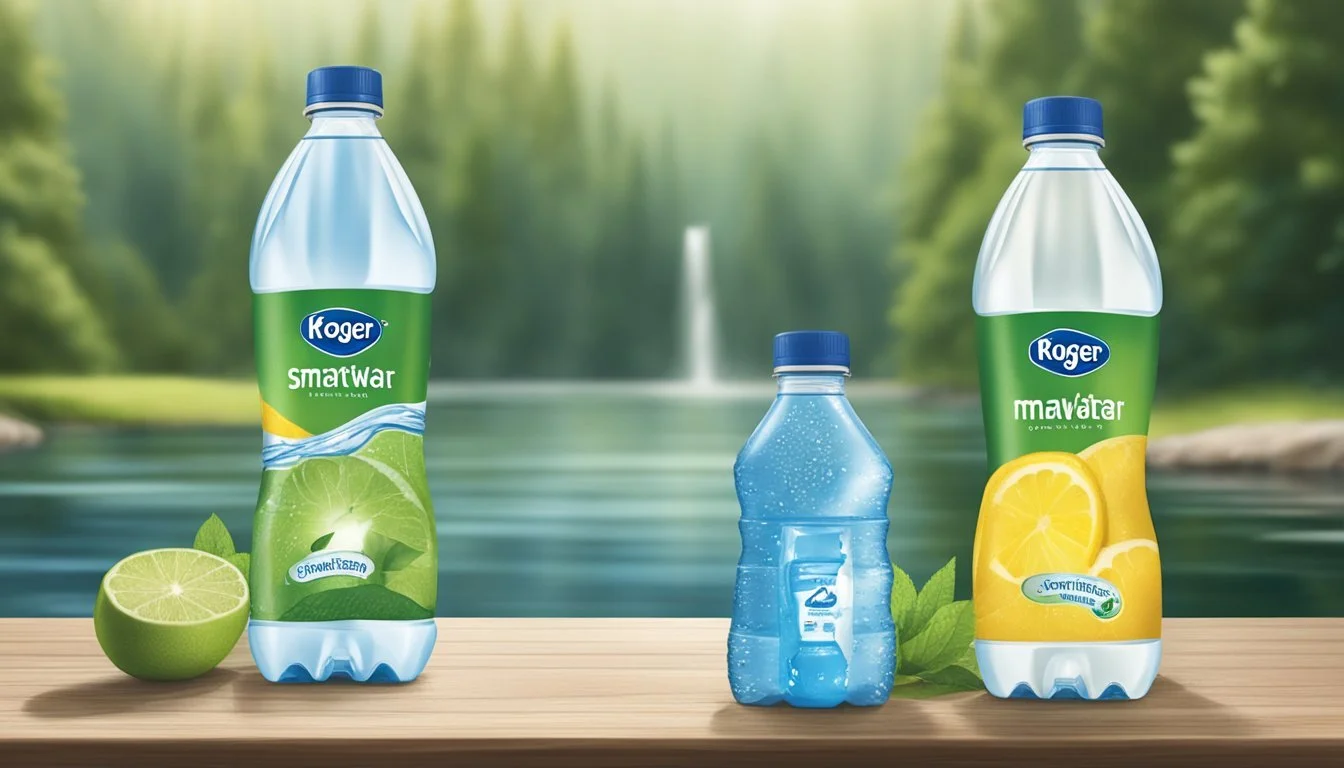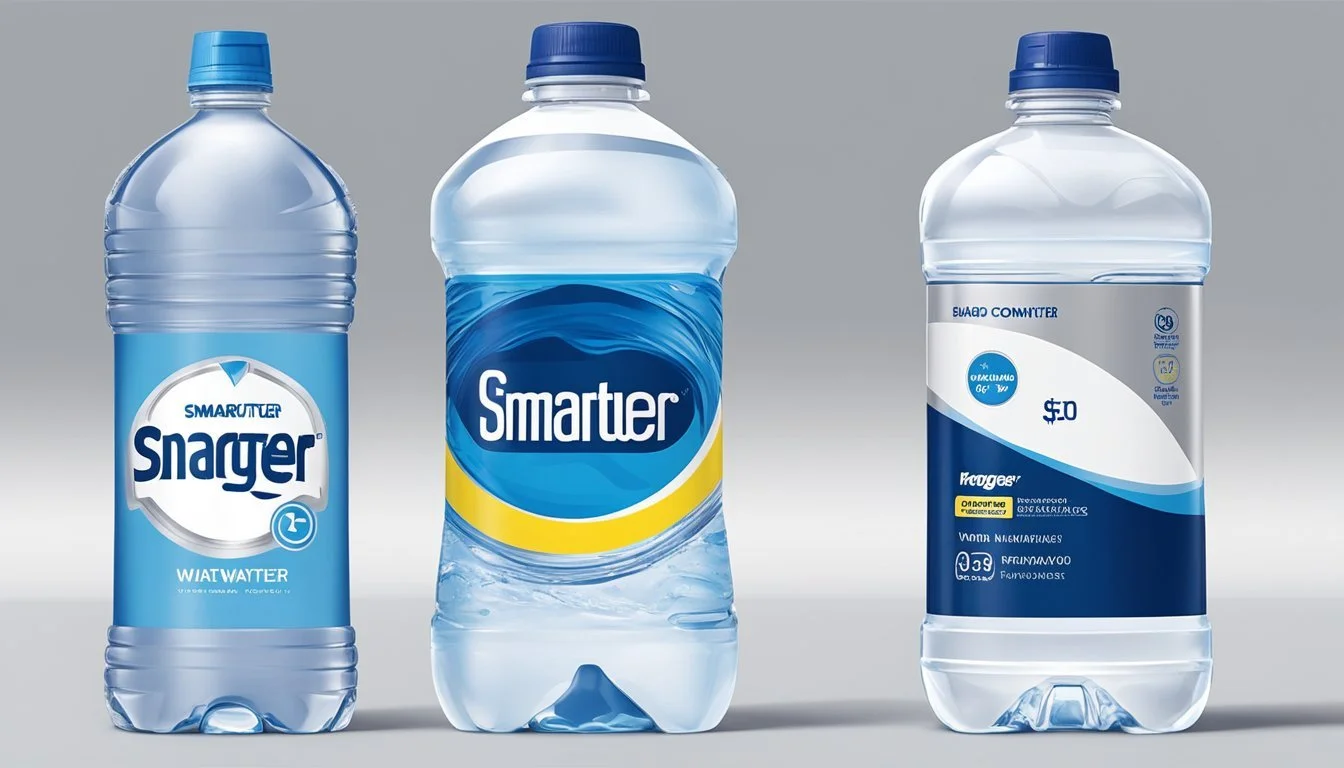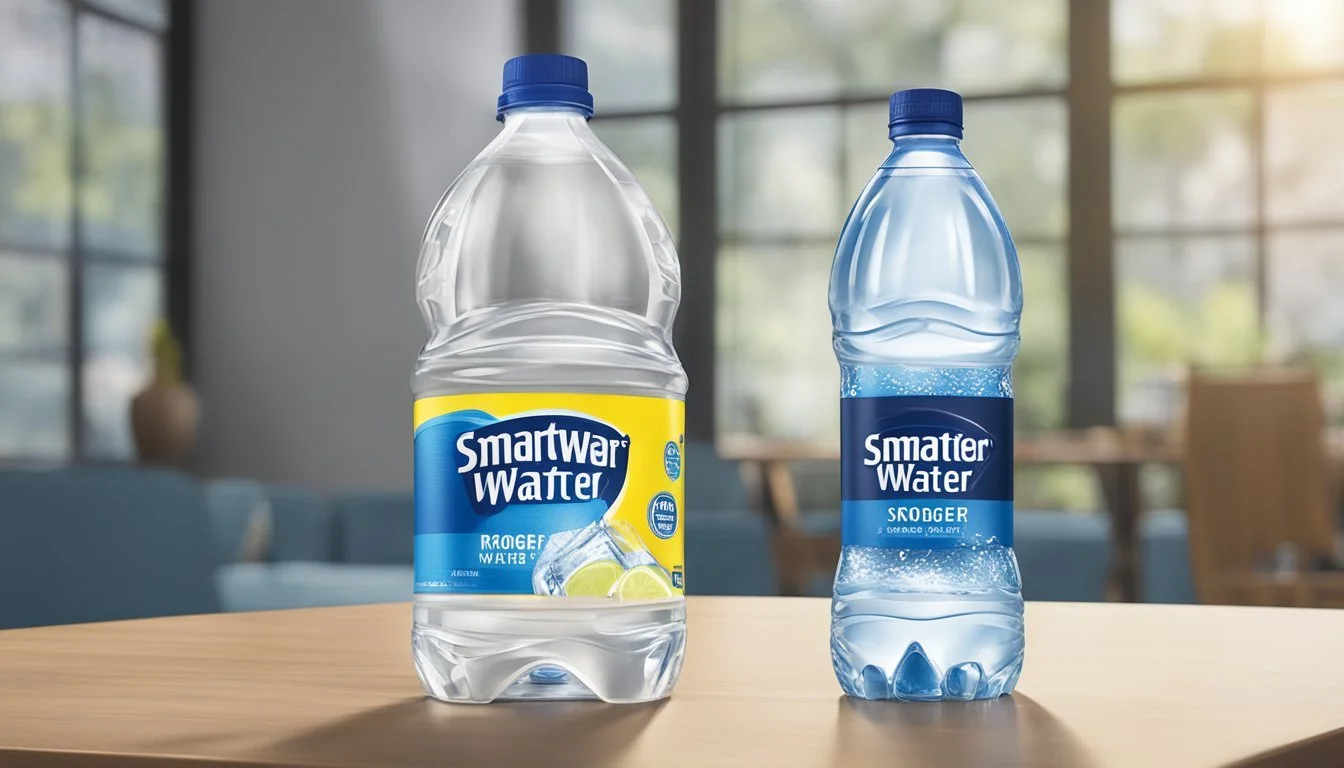Smartwater vs. Kroger
Comparing Bottled Water Quality
Choosing the right bottled water can be challenging with so many options available, each claiming to be the best. Smartwater and Kroger's bottled water are two popular choices among consumers. While both brands meet safety and quality standards, there are some key differences that may affect your decision.
Smartwater is known for its vapor-distilled process and added electrolytes, offering a crisp and clean taste. This brand is often marketed as a premium option, appealing to those looking for added health benefits from their water. On the other hand, Kroger bottled water offers a more budget-friendly option, adhering to FDA regulations and ensuring safety, but with concerns about microplastics and environmental impact.
For health-conscious individuals, Smartwater might be a preferable choice due to its purity and enhanced minerals. If cost and accessibility are more critical factors, Kroger's bottled water is a viable alternative that doesn't compromise on safety standards. Understanding these nuances can help you make an informed decision tailored to your preferences and needs.
The Emergence of Bottled Water
The concept of bottled water dates back centuries but gained significant traction in the 20th century. Originally, mineral waters from natural springs were bottled for their perceived health benefits and sold as luxury items.
Over time, the convenience of bottled water became apparent. Consumers placed great value on the portability and perceived purity of bottled water, leading to a boom in the market. Many brands emerged, each promising superior hydration and safety compared to tap water.
Plastic bottles became the primary packaging method due to their lightweight nature and cost-effectiveness. However, concerns about environmental impact and health risks, such as BPA contamination, have led to increased scrutiny.
Glass bottles offer an alternative, often seen as a premium choice. They have minimal environmental impact compared to plastic and do not leach chemicals into the water. Brands like Pellegrino use glass to emphasize quality and health benefits.
Despite these concerns, bottled water remains popular, largely due to aggressive marketing and the convenience it offers. Consumers looking for safe, portable hydration options have a plethora of brands from which to choose, each catering to different preferences and needs.
In summary, the evolution of bottled water has been driven by a combination of consumer demand for convenience, safety, and environmental considerations. Despite the drawbacks, the industry continues to innovate and adapt to meet changing preferences.
Comparing Brands: Smartwater and Kroger
Consumers often seek information about both the heritage and technical details of Smartwater and Kroger bottled waters to make an informed choice. Below, we explore their histories, ingredients, filtration methods, and environmental considerations.
Brand History and Evolution
Smartwater, a product of the Coca-Cola Company, was launched in 1996. It quickly gained recognition for its premium branding and innovative vapor-distillation process. Kroger, on the other hand, is known primarily as a grocery chain that expands its private-label product line, including bottled water, to offer affordable options to its customers. While Kroger’s bottled water hasn't achieved the same level of market differentiation, it remains a staple in homes for its accessibility and cost-effectiveness.
Ingredients and Water Source
Smartwater touts its unique profile, starting with water that is vapor-distilled and enriched with electrolytes like calcium, magnesium, and potassium for taste. Kroger’s bottled water typically sources from local municipal water supplies and is stripped of impurities through basic filtration processes. Unlike Smartwater, which emphasizes its added benefits, Kroger’s product is marketed as a straightforward, no-frills hydration solution.
Filtration and Purification Processes
Smartwater uses a sophisticated vapor-distillation process that mirrors the hydrological cycle. This process converts water into vapor, removing impurities, and then recondenses it back into liquid—ensuring a high purity level. Additionally, Smartwater adds electrolytes after distillation for enhanced flavor. Kroger bottled water usually undergoes standard reverse osmosis to filter out contaminants. Though effective, this method does not include the additional steps or enhancements found in Smartwater’s process.
Packaging and Environmental Impact
Both brands face scrutiny regarding the environmental impact of their plastic packaging. Smartwater utilizes BPA-free plastic bottles and has initiatives aimed at increased sustainability, including efforts to use recycled PET (rPET) plastic in its bottles. Kroger also offers BPA-free bottles but has been slower to adopt wider sustainability practices. The environmental footprint is a growing concern for both brands, and consumers are increasingly mindful of choosing options that align with environmentally friendly practices.
Nutritional Profile of Bottled Water
The nutritional profile of bottled water varies widely between brands, with key differences in mineral content and electrolyte levels. These variations can influence taste and hydration effectiveness.
Mineral Content Comparison
Bottled waters often contain varying levels of minerals such as calcium, magnesium, and potassium.
Smartwater is known for its vapor-distilled process with added electrolytes for taste, but it has lower levels of naturally occurring minerals compared to many spring waters.
Kroger bottled water, adhering to FDA regulations, typically has fewer added electrolytes than Smartwater but offers a clean, mild taste largely due to its filtration process.
For users seeking higher mineral content, options like Pellegrino or traditional mineral waters might be preferable. Bottled waters are generally low in minerals compared to dietary sources, and they don't significantly contribute to daily mineral intake.
Electrolytes and Their Significance
Electrolytes such as sodium and potassium play crucial roles in maintaining hydration and muscle function.
Smartwater contains added electrolytes, including potassium, calcium chloride, and magnesium chloride, primarily to improve taste and offer a slight hydration edge.
The presence of these electrolytes can aid in quicker rehydration during physical activity or hot weather.
Kroger bottled water may also contain trace amounts of electrolytes, but they are less emphasized than in Smartwater. Consistency in electrolyte levels varies between batches, making it less reliable for rehydration compared to electrolyte-fortified waters.
Choosing a bottled water with added electrolytes can be beneficial for individuals with higher hydration needs, though everyday consumption of plain water generally suffices.
Health and Safety Considerations
When considering Smartwater and Kroger bottled water, it is important to examine potential contaminants, the hydration benefits, and adherence to FDA regulations.
Contaminants and Purity Levels
Smartwater boasts vapor-distilled water with added electrolytes for a pure and crisp taste. It is generally free of contaminants such as lead, arsenic, and heavy metals. However, concerns about plastic packaging remain, particularly regarding estrogenic chemicals and microplastics.
Kroger bottled water follows FDA regulations for safety. Although BPA has been removed from many bottles, there can still be trace amounts of contaminants like microplastics and PFAS chemicals. Consumers concerned about purity should consider these factors.
Hydration and Health Benefits
Smartwater is designed to enhance hydration due to its addition of electrolytes. This can be beneficial for those needing to replenish lost minerals after exercise. It supports overall hydration and helps maintain a balanced immune system.
Kroger bottled water, while not enhanced with electrolytes, is still effective for daily hydration. The key benefit is its basic composition: pure water without any harmful additives, making it a safe option for health-conscious consumers.
FDA Regulations and Industry Standards
Both Smartwater and Kroger bottled water comply with FDA regulations to ensure consumer safety. These regulations stipulate that bottled water must meet standards for contaminants, including heavy metals and PFAS chemicals.
Smartwater's commitment to purity includes its vapor-distillation process, aligning with industry standards for high-quality bottled water. Kroger also adheres to these standards, ensuring that their water is free of harmful levels of contaminants or impurities.
Tasting Notes: Water Flavor Profiles
In comparing Smartwater and Kroger bottled waters, two critical factors stand out: the pH levels and alkalinity, and the results of taste tests.
pH Levels and Alkalinity
Smartwater markets a version of its product called Smartwater Alkaline, which boasts a higher pH level. Typically, this version is aimed at consumers interested in maintaining a slightly alkaline balance, with a pH higher than neutral (7.0).
Kroger bottled water generally falls within the neutral pH range, around 7.0, with some variations based on specific product lines.
Comparison:
Smartwater Alkaline: Higher pH (>7.0), may offer a smoother taste experience.
Kroger: Neutral pH (≈7.0), consistent taste that is familiar to most consumers.
Understanding the pH levels helps in discerning the subtle differences in taste between the two brands.
Taste Test Results
Taste testing revealed notable differences between Smartwater and Kroger bottled water. Smartwater is often described as having a clean, crisp taste with a slight mineral finish. This subtle minerality is appealing to those who prefer water with a touch of flavor without overpowering.
Kroger water tends to offer a straightforward, no-nonsense water taste. It's pure with no distinct aftertaste, which appeals to those who prefer a neutral flavor profile in their bottled water.
Key Observations:
Smartwater: Clean and crisp, with a slight mineral aftertaste.
Kroger: Pure, neutral taste with no significant aftertaste.
These taste characteristics make each brand suitable for different preferences.
Consumer Preferences and Trends
Consumers today are increasingly discerning about their beverage choices, influenced by factors like brand loyalty, health benefits, and accessibility. Analyzing Smartwater and Kroger bottled waters, distinct trends emerge.
Market Share and Popularity
Smartwater, positioned as a premium brand, benefits from effective marketing and placement strategies. Its association with purity, enhanced by the addition of electrolytes, appeals to health-conscious consumers. Smartwater enjoys significant shelf space in major retail outlets, making it a frequent pick for many.
On the other hand, Kroger's bottled water, often seen as a budget-friendly option, has a loyal customer base due to its cost-effectiveness. Kroger leverages its supermarket presence to maintain a steady market share, especially among price-sensitive shoppers.
Convenience and Lifestyle Impacts
One major factor driving Smartwater’s appeal is its packaging and branding, which target individuals leading active and busy lifestyles. Smartwater bottles are sleek, designed for easy carrying, fitting into the hustle of daily commutes and workouts.
Kroger’s bottled water focuses on the everyday convenience. Its availability in large multipacks makes it ideal for families and bulk buyers. This brand’s focus on accessibility caters to a broad audience, ensuring hydration is an affordable priority.
Smartwater positions itself as a premium choice for those seeking enhanced hydration, while Kroger offers practical solutions for everyday needs. Each brand captures different yet overlapping segments of the bottled water market.
Environmental and Sustainability Factors
Both Smartwater and Kroger bottled water present unique challenges and solutions related to environmental impacts and sustainability. Key areas of focus include the use of plastic bottles and ongoing innovations to reduce environmental footprint.
The Impact of Plastic Bottles
The widespread use of plastic bottles has significant environmental repercussions.
Plastic pollution poses severe threats to marine life and ecosystems. Millions of tons of plastic waste end up in the oceans annually, creating lasting damage.
Kroger bottled water typically comes in plastic bottles, contributing to this issue. Smartwater also uses plastic bottles, often made from PET plastic, which, while recyclable, sees limited recycling rates globally.
Additionally, the production and transportation of plastic bottles generate greenhouse gases, further impacting climate change. Consumers are increasingly aware of these impacts and are pushing for more sustainable options.
Innovations in Bottled Water Packaging
Efforts to create more environmentally friendly packaging are gaining traction within the bottled water industry.
Smartwater has made strides by offering bottles that are 100% recyclable and exploring the use of recycled materials in their packaging. Some initiatives include the introduction of bottles made with up to 50% recycled plastic.
Kroger is also looking into more sustainable packaging solutions. They're examining potential shifts to biodegradable or plant-based plastics to reduce their environmental footprint.
Both brands are assessing alternative packaging formats, like boxed water or glass bottles, to provide more recyclable and less polluting options. These innovations are indicative of a broader industry trend aiming to balance consumer demand with environmental responsibility.
Analyzing these steps reveals a commitment to reducing the negative environmental impacts of bottled water, though significant challenges remain.
The Bottom Line: Making an Informed Choice
When choosing between Smartwater and Kroger bottled water, consider various factors including safety, purity, and taste.
Smartwater markets itself as a brand of purified water with added electrolytes for taste. It is free from impurities and formulated without unhealthy additives. Concerns, though, exist regarding its plastic packaging, which may leach estrogenic chemicals.
Kroger bottled water, adhering to FDA safety standards, also offers a reliable option. Some potential issues include the presence of microplastics and other contaminants found in bottled waters. However, many containers are now BPA-free, reducing certain risks.
Quick Comparison
Criteria Smartwater Kroger Bottled Water Purity Purified without additives Meets FDA standards, some contaminants Packaging Plastic, potential chemical leaching BPA-free options available Additives Electrolytes added for taste No significant additives
Key Considerations
Safety: Both brands meet regulatory safety standards. Consumers should be aware of potential risks associated with plastic bottles.
Taste: Preference for added electrolytes (Smartwater) vs. standard purified water (Kroger).
Different individuals might prefer one over the other based on personal taste, concern over contaminants, or environmental impact considerations. Making an informed decision involves weighing these aspects against individual needs and values.
More About Smartwater
Core Hydration vs Smartwater: Which Bottled Water is Better?
Icelandic Glacial vs Smartwater: Which Bottled Water is Better?
Mountain Valley Spring Water vs Smartwater: Which Bottled Water is Better?
Nestle Pure Life vs Smartwater: Which Bottled Water is Better?
San Pellegrino vs Smartwater: Which Bottled Water is Better?
Smartwater vs Aqua Carpatica: Which Bottled Water is Better?
Smartwater vs Cascade Mountain: Which Bottled Water is Better?
Smartwater vs Crystal Geyser: Which Bottled Water is Better?
Smartwater vs Hawaii Volcanic: Which Bottled Water is Better?
Smartwater vs Hawaiian Springs: Which Bottled Water is Better?
Smartwater vs Kirkland Signature: Which Bottled Water is Better?
Smartwater vs Richard's Rainwater: Which Bottled Water is Better?
Smartwater vs Solan de Cabras: Which Bottled Water is Better?
Smartwater vs Talking Rain AQA: Which Bottled Water is Better?
Smartwater vs Whole Foods 365: Which Bottled Water is Better?
Smartwater vs Whole Foods Italian Still Mineral water: Which Bottled Water is Better?





